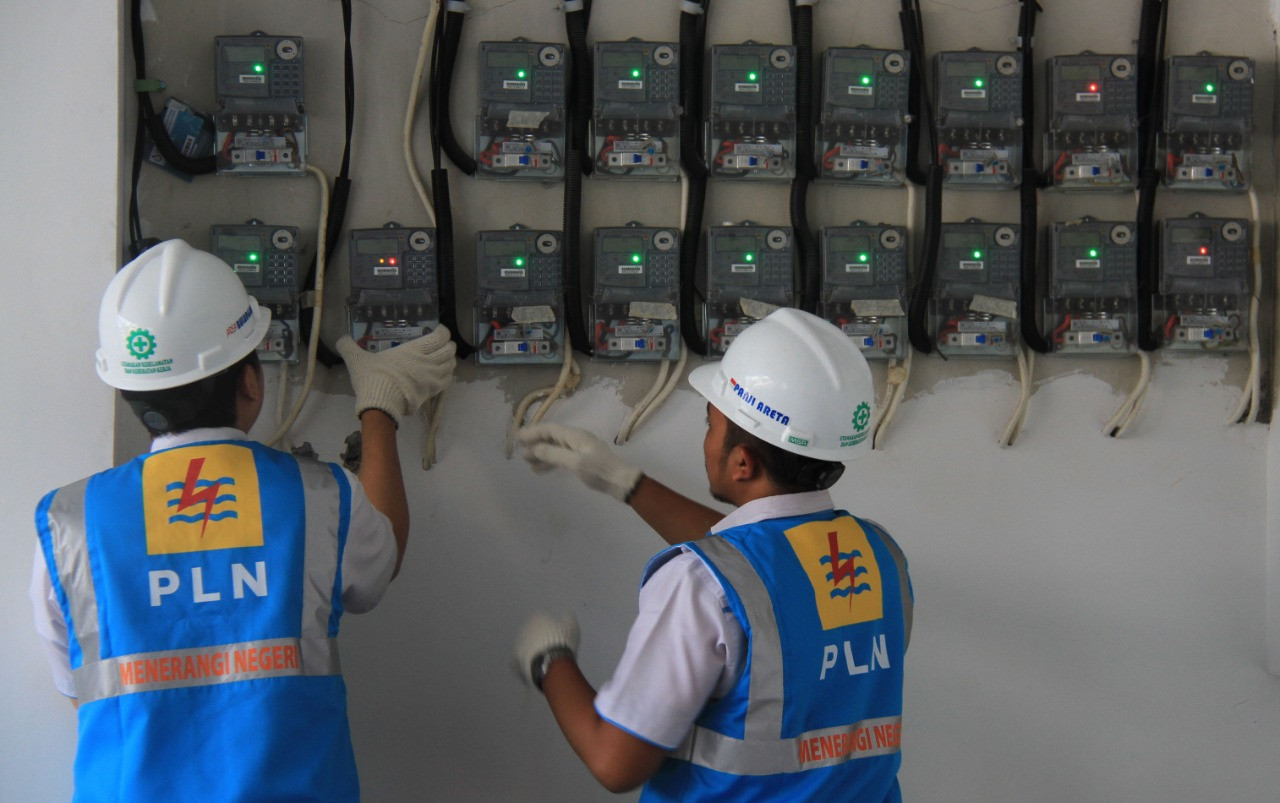Popular Reads
Top Results
Can't find what you're looking for?
View all search resultsPopular Reads
Top Results
Can't find what you're looking for?
View all search resultsPLN to install 79 million smart meters in Indonesia after billing fiasco
Change text size
Gift Premium Articles
to Anyone
 State-owned electricity company PLN workers inspect electricity meters in this undated photo. PLN has conveyed a plan to install 79 million smart meters across the country over the next seven years to automate the billing process as millions of customers complained of spiking bills in recent weeks. (PLN/PLN)
State-owned electricity company PLN workers inspect electricity meters in this undated photo. PLN has conveyed a plan to install 79 million smart meters across the country over the next seven years to automate the billing process as millions of customers complained of spiking bills in recent weeks. (PLN/PLN)
S
tate-owned electricity company PLN has conveyed a plan to install 79 million smart meters across the country over the next seven years in an effort to automate the billing process as millions of customers have complained about spiking bills in recent weeks.
PLN president director Zulkifli Zaini said on Wednesday that the plan was a more efficient alternative to recalibrating old meters, which often misread power consumption.
“The cost of recalibrating a meter is about the same as changing the meter,” he said, adding that the recalibration had to be done in special test labs.
“The biggest challenge with the recalibrations is the limited capacity of Trade Ministry testing labs.”
Unlike standard meters, smart meters can wirelessly transmit information between the electricity company and users. PLN will be able to remotely monitor users’ power consumption round-the-clock instead of sending meter inspectors once a month.
Around 4.6 million residential customers of PLN reported a spike in their power bills in June amid the implementation of the government’s working-from-home policy to contain the coronavirus spread.
Trade Ministry metrological director Rusmin Amin noted during a webinar on Monday that uncalibrated standard meters had no direct relation to the incident. PLN previously admitted the spikes were due to flaws in its new bill calculation method implemented during the physical distancing period as its inspectors were unable to conduct site inspections.
State-Owned Enterprises (SOEs) Minister Erick Thohir suggested on June 12 that PLN develop smart meters, among other innovations, to avoid such flawed calculation methods in the future.
“Going forward, PLN needs to push innovation when providing services,” he said.
There are currently 14.3 million uncalibrated standard meters in Indonesia, said Rusmin. The meters comprise electronic versions that need recalibration once every 15 years and mechanical versions that need recalibration once in a decade.
“A faulty device can mean a loss for both consumers and PLN,” he said.
The uncalibrated meters either overstate power consumption by 15 percent or understate it by 17 percent, according to the ministry’s 2011 survey in West Java and Banten. The former situation would amount to a loss for consumers while the latter would cause losses for PLN.
National Consumer Protection Agency (BPKN) chairman Ardiansyah Parman, speaking at the webinar, urged PLN to implement the plan starting next year. He also urged the company to prioritize replacing the 14 million uncalibrated meters with smart meters.
“This is so that PLN’ and to consumers’ losses may be solved immediately,” he said.
The agency received five complaints related to electricity and gas bills this year, which represents 0.86 percent of all complaints received this year. Two-thirds of the complaints were related to housing.
However, Herman Ibrahim, country chairman of the Paris-based International Council on Large Electric Systems (CIGRE), separately said residential smart meters were ill-suited for Indonesia’s electricity system, despite being a global technological trend.
He noted that such meters were best suited for more advanced electric grids, which had different hourly electricity tariffs and allowed customers to sell electricity generated from renewable sources into the system. Neither mechanisms are being implemented in Indonesia in scale.
“If they were just used for normal purposes, it would be too luxurious,” he told The Jakarta Post on Monday, adding that smart meters cost more than standard meters.
Herman added that smart meters were only beneficial in environments with stable internet connectivity, which remains a big issue in non-urban Indonesia.









